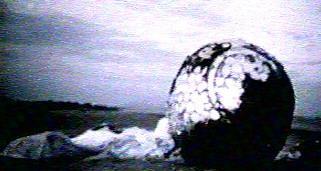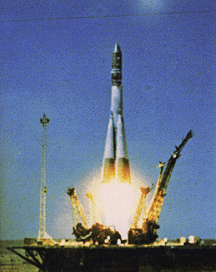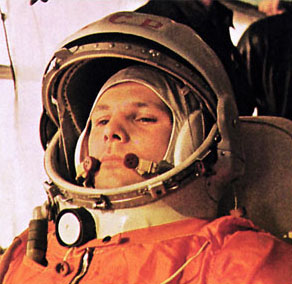(Dec 2006)



"Space... the final frontier."
While the voyages of the Starship Enterprise are still fiction, they might actually happen, in some form or other, someday. In fact, they'd bloody well better...if this pathetically inept race of creatures called Homo sapiens is to survive.
And we've just begun to take the first steps...
What is the most important event in human history? Is it the invention of the wheel? Is it the advent of modern medicine? Is it the splitting of the atom? Well, while the first of those three was an extremely important event in itself, it was not essential for the survival of the species or even of civilisation (and the Incas constructed an organised civilisation without using the wheel for anything more complex than children's' pull-along toys). As for the second, yes, it has been a revolution that has extended lifespans and given people the time and leisure to dream of a better future. But the time of medicine is inexorably heading towards a dead end; germs are becoming resistant to the latest and best antibiotics, and the gains of health are being counterbalanced by the lifestyle diseases that have emerged. Medicine is now on track to perform spectacular but essentially meaningless feats like face transplants and the search for "immortality" - not the most vital goal for the preservation of the human race.
And as for the splitting of the atom, just look at where that little feat has got us.
So, what are we left with?
For an answer, look around the world.
We face runaway global warming, species sliding into extinction, accelerating desertification and environmental degradation, melting ice caps, corporate profits being given more importance than ecology, and as though Operation Endless War and the concomitant jehadi response weren't enough, there will soon be widespread water wars. We face new and devastating diseases, and old diseases reappearing in new forms. We face the threat of an unknown asteroid smashing into the planet (an inevitable occurrence, given enough time) and sending us to where the dinosaurs hang out these days.
Even if we manage to get out of this mess, in just a few billion years the sun is going to become a red giant and burn the earth into a cinder...
We face, in a word, extinction.
As Stephen Hawking said some time back, the only hope we have is to go out into space, move out and form colonies, set up outposts, create new forms of humans (and I'd like to say, also the other creatures whose place ion this planet is being threatened by our activities).
Well, we've made a sort of start.
That start was not made too long ago. In fact, it's been not even half a century.
On the morning of April 12, 1961, a primitive little spacecraft called Vostok 1 ("Vostok" means "East" in Russian) lifted off from the launchpad at Tyuratam, Kazakhstan, atop a converted heavy lift intercontinental ballistic missile called the A1 (the best use for a missile I can imagine, personally - the Russians entered it in the space race after realising that it was unnecessarily heavy lift for a weapons programme). It contained a single cosmonaut, a MiG-15 pilot called Major Yuri Alekseyevich Gagarin, and returned to earth after a single orbit. The entire voyage lasted 108 minutes from launch till Gagarin (who ejected from the craft at a height of 7000 metres, because Vostok landings were too hard for a human to endure without injury) and his capsule descended separately by parachute near Engels in Saratov.
The mission was long in the preparation (a detailed account is here), and achieved virtually nothing in terms of scientific knowledge beyond proving that a man could lift off from earth, orbit, eat and drink, and write in weightlessness, and return unharmed. It would have returned much more data if the mission had included just an instrument payload, because instruments don't have to be fed, given air, kept safe, or returned to earth. Yet is it such a small achievement? Think about it. If we are to set out on a journey of a thousand light years, a single step has to begin it, am I right?
Besides...
Besides, while I'm personally certain life exists elsewhere in the universe, and more than likely in primitive forms within this solar system of ours (Mars, where running water has recently been discovered, or Europa, or Jupiter's atmosphere), until we can actually find such life, we must proceed on the assumption that we are alone. In that case our responsibility for preserving life becomes unique in its gravity. If we go into the dark, then, there will be nothing to take over from us. There will be nothing left. Nothing. Anywhere.
And that is why I think Gagarin's flight is the single most important moment in history. As Gagarin himself said, it was an achievement for the whole of mankind, not just of the Soviet people.
Human civilisation is only 7,000 years old, and countless years lie ahead - we hope. But wherever future adventurers travel, whatever they find in the black, cold reaches of space, they will always remember the pair that preceded them—the Vostok and Major Yuri Alekseyevich Gagarin.
"To boldly go where no man has gone before..."
It doesn't sound so ridiculous any more.



"Space... the final frontier."
While the voyages of the Starship Enterprise are still fiction, they might actually happen, in some form or other, someday. In fact, they'd bloody well better...if this pathetically inept race of creatures called Homo sapiens is to survive.
And we've just begun to take the first steps...
What is the most important event in human history? Is it the invention of the wheel? Is it the advent of modern medicine? Is it the splitting of the atom? Well, while the first of those three was an extremely important event in itself, it was not essential for the survival of the species or even of civilisation (and the Incas constructed an organised civilisation without using the wheel for anything more complex than children's' pull-along toys). As for the second, yes, it has been a revolution that has extended lifespans and given people the time and leisure to dream of a better future. But the time of medicine is inexorably heading towards a dead end; germs are becoming resistant to the latest and best antibiotics, and the gains of health are being counterbalanced by the lifestyle diseases that have emerged. Medicine is now on track to perform spectacular but essentially meaningless feats like face transplants and the search for "immortality" - not the most vital goal for the preservation of the human race.
And as for the splitting of the atom, just look at where that little feat has got us.
So, what are we left with?
For an answer, look around the world.
We face runaway global warming, species sliding into extinction, accelerating desertification and environmental degradation, melting ice caps, corporate profits being given more importance than ecology, and as though Operation Endless War and the concomitant jehadi response weren't enough, there will soon be widespread water wars. We face new and devastating diseases, and old diseases reappearing in new forms. We face the threat of an unknown asteroid smashing into the planet (an inevitable occurrence, given enough time) and sending us to where the dinosaurs hang out these days.
Even if we manage to get out of this mess, in just a few billion years the sun is going to become a red giant and burn the earth into a cinder...
We face, in a word, extinction.
As Stephen Hawking said some time back, the only hope we have is to go out into space, move out and form colonies, set up outposts, create new forms of humans (and I'd like to say, also the other creatures whose place ion this planet is being threatened by our activities).
Well, we've made a sort of start.
That start was not made too long ago. In fact, it's been not even half a century.
On the morning of April 12, 1961, a primitive little spacecraft called Vostok 1 ("Vostok" means "East" in Russian) lifted off from the launchpad at Tyuratam, Kazakhstan, atop a converted heavy lift intercontinental ballistic missile called the A1 (the best use for a missile I can imagine, personally - the Russians entered it in the space race after realising that it was unnecessarily heavy lift for a weapons programme). It contained a single cosmonaut, a MiG-15 pilot called Major Yuri Alekseyevich Gagarin, and returned to earth after a single orbit. The entire voyage lasted 108 minutes from launch till Gagarin (who ejected from the craft at a height of 7000 metres, because Vostok landings were too hard for a human to endure without injury) and his capsule descended separately by parachute near Engels in Saratov.
The mission was long in the preparation (a detailed account is here), and achieved virtually nothing in terms of scientific knowledge beyond proving that a man could lift off from earth, orbit, eat and drink, and write in weightlessness, and return unharmed. It would have returned much more data if the mission had included just an instrument payload, because instruments don't have to be fed, given air, kept safe, or returned to earth. Yet is it such a small achievement? Think about it. If we are to set out on a journey of a thousand light years, a single step has to begin it, am I right?
Besides...
Besides, while I'm personally certain life exists elsewhere in the universe, and more than likely in primitive forms within this solar system of ours (Mars, where running water has recently been discovered, or Europa, or Jupiter's atmosphere), until we can actually find such life, we must proceed on the assumption that we are alone. In that case our responsibility for preserving life becomes unique in its gravity. If we go into the dark, then, there will be nothing to take over from us. There will be nothing left. Nothing. Anywhere.
And that is why I think Gagarin's flight is the single most important moment in history. As Gagarin himself said, it was an achievement for the whole of mankind, not just of the Soviet people.
Human civilisation is only 7,000 years old, and countless years lie ahead - we hope. But wherever future adventurers travel, whatever they find in the black, cold reaches of space, they will always remember the pair that preceded them—the Vostok and Major Yuri Alekseyevich Gagarin.
"To boldly go where no man has gone before..."
It doesn't sound so ridiculous any more.
No comments:
Post a Comment